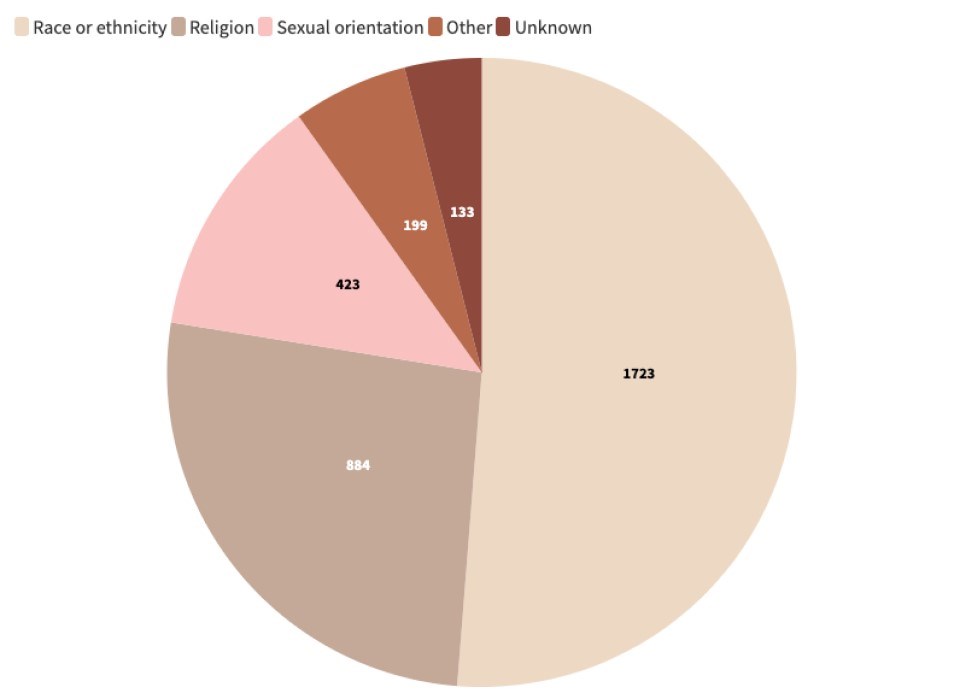Police-reported hate crimes and incidents spiked in four B.C. metropolitan areas in 2021, some even doubling since 2020.
That's according to recent data from Statistics Canada. The national agency included Abbotsford-Mission, Kelowna, Vancouver and Victoria in its data release; those metro areas accounted for a 21 per cent increase in crime and incidents reported to police from 2020 to 2021.
Glacier Media reached out to each police agency to find out what the increase was and also what type of hate crime incidents were reported in 2021.
In 2021, Abbotsford-Mission saw a rise from eight to 16 hate-reported incidents.
Sgt. Paul Walker with Abbotsford Police says the department saw nine mischief-related files that involved graffiti-related symbols left on buildings and public spaces.
"The seven further files were files that involved people saying specific verbal comments to other citizens that were derogatory or racial in nature,” he says.
Back in 2020, the department saw similar numbers for derogatory or racial comments but did not see the graffiti crimes.
In Kelowna, police-reported hate crime incidents rose from six to 24 from 2020 to 2021.
Kelowna RCMP Supt. Kara Triance said the numbers were alarming to the detachment.
“We did have an opportunity to dig into the statistics on hate crimes because that one jumped off the pages. Extremely alarming,” she says.
Triance attributes the spike to the COVID-19 pandemic.
“I can say with accuracy that that is a COVID-related, alarming and distasteful and horrific response to people making anti-Semitic remarks to people... referring to the mask mandates and the mandates by the federal government,” she says.
During a media press conference, Triance clarified that hate crime incidents and hate crimes are two separate things.
“These came through as hate-reported incidents, which means we might have a protest and hate is associated or we might have a targeted response at an individual and hate is brought forward. However, a crime is not necessarily committed, so they haven't assaulted somebody and made a hateful statement,” she says.
Vancouver Police, which has an entire hate crime task force, points to the pandemic as well for the increase they saw (from 372 to 429).
"We can’t give a definitive answer, but of the hate crimes that were reported since the beginning of the pandemic, there definitely was an increase of anti-Asian hate,” says Const. Tania Visintin. “That would be a direct result from the pandemic.”
Glacier Media reached out to Victoria Police to understand why police-reported hate crime incident numbers rose from 35 to 40, but did not receive a response.
The data, released Tuesday, showed Victoria police-reported crime in 2021 was once again well above the provincial average and that of Vancouver.
The index, which measures the volume and severity of police-reported crime last year, noted Victoria’s index was 148, a slight improvement from 2020’s 168, but still well above the provincial index of 93 and Vancouver’s 90.

Statistics Canada also noted that in 2021, there were a total of 3,360 hate crimes and 1,723 were motivated by race or ethnicity, 884 were religion, 423 were sexual orientation, 199 were other motivations and 131 were “unknown.”
The number of police-reported hate crimes in Canada increased by 27 per cent in 2021, rising from 2,646 incidents to 3,360. This follows a 36 per cent increase in police-reported hate crimes from 2019 to 2020.
ADVOCATES CALL FOR EMPATHY
Muhi Bakini, a diversity education supervisor at Archway Community Services, is an advocate and provides support for people who experience hate crimes.
When he saw the release on Tuesday, he was alarmed.
"Like any concerned Canadian citizen I was shocked and... disappointed,” he says. "This is a little bit alarming. This is not just an increase, it actually doubled."
Bakini says it is important to think about why there has been an increase and it might need further interpretation.
“Is it actually an increase in the number of hate crimes in the cities, or actually, it is an indication of something positive and good actually happening in terms of the police being able to identify and investigate these incidents? ... Because they're traditionally ignored or not taken seriously,” he says.
One possibility he points to is the community trusting the police and coming forward with their experiences.
“Members of the public are becoming more trusting of the police and leading them to report these incidents to the police. I really hope that was what is happening rather than actually seeing an increase,” he tells Glacier Media.
Mental and psychological impacts often follow hate crimes and his department provides a safe space and outlet for victims to use, he says.
“We assess the situation and sometimes we refer clients to mental health experts, sometimes to legal advocacy.”
Some "newcomers” that he works with often don’t fully understand that they’ve experienced a hate crime.
In his current role, he spends a lot of time working with people who have been targeted.
“It's actually about just being able to listen to them, people would like to be listened to and validated. So most of the time, I just give my ears and listen, and they're able to vent, and then understand their experiences,” says Bakini.
He wants the public to know that hate crimes are real in Canada and for people to have an empathy-based approach to people who've been on the receiving end.
“They happen. People experience victimization and vulnerabilities,” he says. “I hope this data is like a wake-up call for all of us to do something."
If you or someone you know has experienced a hate crime there is a 24/7 helpline available by calling or texting 1-800-563-0808. You can also email [email protected].


